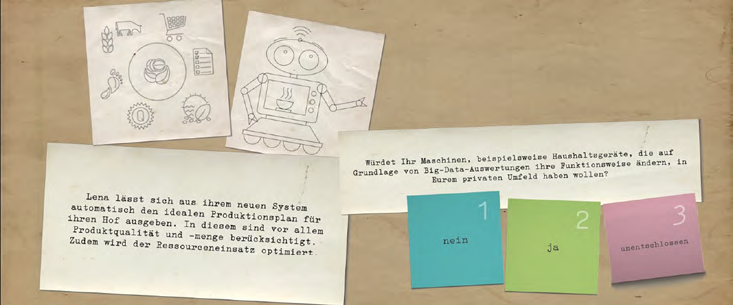FoodNetLab - Exploratory Pilot: Food Value Network Innovation Lab
Short Description
The food industry is of significant economic and social importance to Austria. According to Statistics Austria, in 2016 private households spent around 16 billion euros on food. The new information and communication technologies will bring about diverse changes in the future, e.g., by enabling food personalisation, direct contact between producers and consumers, and the increasing use of smart solutions across the supply chain and by consumers.
The project was designed to develop and discuss future scenarios with representatives of the food supply chain (e.g., food producers), the supporting industry (e.g., refrigeration system suppliers) and experts from politics, education and public relations, which were subsequently evaluated by citizens in a game-based environment.
In a first step, potential factors influencing the developments were identified and discussed with some 50 experts in focus group workshops. The participants classified 40 factors as relevant or highly relevant to the future of the food industry. For example, the increasing traceability of logistic processes was considered a central issue.
Experts believe that new sensor data and information sharing along the supply chain will create a completely new level of transparency, which goes far beyond current statutory traceability requirements. This approach will give both producers and consumers a clear picture of the condition and quality of raw materials and food products at any point in the supply chain.
The relevant influencing factors were assessed for mutual relationships in an online survey conducted among employees of the participating organisations. These relationships were subsequently investigated in more detail using network analysis. Four clusters of related influencing factors were identified:
- online commerce
- data integration for the customer's benefit
- quality assurance & transparency, and
- data integration for increased production efficiency.
Experts then designed basic scenarios for each of these clusters, which served as a basis for developing a game-based installation at the Welios museum in Wels. The installation allowed players to implicitly let the research team know what they think about desired developments in the food sector.
Project Partners
Consortium lead
FH OÖ Forschungs & Entwicklungs GmbH
Contact Address
FH OÖ Forschungs & Entwicklungs GmbH
FH-Prof. Dr.-Ing. Katrin Mathmann &
FH-Prof. Dipl.-Wirtsch.-Ing. Dr. Christiane Rau
Roseggerstraße 15
A-4600 Wels

